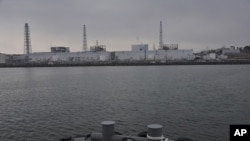Nuclear safety officials say a newly discovered crack in Japan's damaged nuclear plant could be the source of radioactive water that is leaking into the ocean.
Nuclear safety spokesman Hidehiko Nishiyama told reporters Saturday that the water could be leaking into the Pacific Ocean from a 20-centimeter crack in a maintenance pit on the edge of the Fukushima nuclear site. He said there could be other similar cracks and "we must find them as quickly as possible."
Tokyo Electric Power Company is starting to pour concrete into the pit in an attempt to seal the crack.
Earlier in the day, Japanese Prime Minister Naoto Kan set foot in the tsunami-devastated region for the first time, meeting workers in the nuclear exclusion zone and talking to residents made homeless by the March 11 disaster. Kan stopped in the fishing village of Rikuzentakata, where the town hall is one of the few buildings that was not leveled by the tsunami. He met with the town's mayor, whose wife was swept away in the disaster and is still missing.
At a school-turned-evacuation center, Kan told evacuees that the government "fully supports you until the end" of the recovery process. But some displaced residents criticized Kan for taking three weeks to personally visit the devastated region. He had flown over the decimated area shortly after the wave hit.
The Japanese leader also visited a village serving as the headquarters for emergency teams trying to cool reactors at the Fukushima nuclear plant.
United Nations Secretary-General Ban Ki-moon told reporters in Nairobi Friday that the situation at the plant "remains very serious." Workers have been struggling to bring the damaged plant under control. Ban said the U.N. is ready to work "very closely" with Japan in overcoming the nuclear crisis as well as in its reconstruction efforts. He also called on the international community to reassess and strengthen nuclear safety guidelines and disaster response frameworks.
The U.N.'s atomic energy agency has warned that high concentrations of radioactive particles have spread outside the 30-kilometer exclusion zone around the nuclear plant. The agency reported Friday that in one village, Litate, some 40 kilometers from the plant, radiation levels are decreasing after spiking at levels substantially above the level at which they normally recommend evacuations.
Japan's says it will be a "reasonably long" period of time before those evacuated from the nuclear-threat zone would be allowed back to their homes. Chief government spokesman Yukio Edano confirmed reports that the groundwater around the plant is contaminated with radiation many times higher than normal, and that testing on cattle had turned up a low-level sample of radioactive-contaminated beef.
Thousands of Japanese and American military personnel joined together Friday in a final three-day sweep to search for those still missing from the March 11 earthquake and tsunami. More than 11,000 people are confirmed dead, with more than 16,500 still missing. But the search teams will stay out of the evacuation zone around the damaged plant.
Some information for this report was provided by AP and Reuters.




